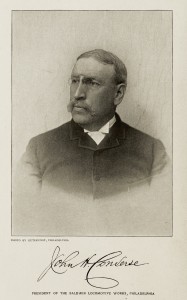Profile – John Heman Converse circa 1901

John Heman Converse Portrait 1901
President of the Baldwin Locomotive Works, Philadelphia
from Cassier’s Magazine 1901
New England has always claimed more credit for raising school houses and men than wheat crops and other staples. Her sons have overrun the small confines which mark her boundaries, and have gone forth to every section of the country. By their native shrewdness and energy they have gained a foothold wherever they have located, and many who have attained prominence and success trace their progenitors back to the “bleak, hillside farms” that abound in the New England States.
True to the traditions of his fellow people, Mr. Converse early left the parental roof to seek and obtain the success which has come to him solely by his own exertions. He was born at Burlington, Vt. , in 1840, and graduated from the University of Vermont in 1861.
Almost immediately thereafter he entered journalism, and was for three years connected with the editorial department of the then Burlington Daily and Weekly Times. Removing to Chicago in 1864, he entered the service of the Chicago & Northwestern Railway Company, in which he continued until 1866, when he removed to Altoona, Pa., to accept a position with the Pennsylvania Railroad, under Edward H. Williams, then general superintendent of that road. Dr. Williams having become, in 1870, one of the proprietors of the Baldwin Locomotive Works, secured for Mr. Converse a desirable position in that establishment. Three years later Mr. Converse was admitted into the firm, and has been connected with it ever since.
The particular department entrusted to Mr Converse is the general business and financial management as apart from the mechanical. How well he masters these duties is evidenced by the wonderful growth of this manufacturing plant. When Matthias W. Baldwin died, in 1866, the output of the works established by him had reached a production of 118 locomotives per annum. To-day their capacity has grown to the enormous figure of over 1000 locomotives per annum. But this comparison fails to convey entirely their wonderful development, for the locomotive of today compares to its prototype of a generation ago as the packet steamer to the modern ocean greyhound. The market for the works is almost the entire civilised world, and Baldwin locomotives have gone in numbers to Mexico, South America, England, France, Russia, Sweden, Norway, Australia, Japan, China, and South Africa. The Baldwin Works may be fittingly characterised as one of the few colossal manufacturing establishments of the world.
But the business activities of Mr. Converse’s life do not end with this great manufacturing plant; they include also directorship in a large number of prominent financial institutions of Philadelphia, all of which receive his active attention. It would seem that such heavy business responsibilities are more than one could well cany, but Mr. Converse brings to them a well-trained mind and a wonderful aptitude in the conduct of financial matters.
In addition to all this, however, Mr. Converse still finds time to devote to some exacting public trusts. Since 1889 he has been a member of the Board of Directors of City Trusts, serving at the head of the committee having in charge all of the Girard estate without the city of Philadelphia. He has recently been transferred to the post of Chairman of the household committee.
He is also a trustee of the Presbyterian Hospital at Philadelphia, the Pennsylvania Academy of Fine Arts, and the University Extension Association. During the war with Spain he served as president of the National Relief Commission, which was organised in Philadelphia in aid of American soldiers and sailors. In many other ways he is connected with public enterprises. His many contributions to public objects have been most liberal. One of the principal buildings of the Presbyterian Hospital he erected entirely at his own expense. His benefactions to churches, charities, and various educational and civic institutions are constant, generous, and indicate an active sympathy with all the progressive humanitarian and religious movements of the day.
In his private life Mr. Converse has gathered around him in a quiet and modest way the luxuries which are congenial to a man of culture. In his home art, music, literature, and genial society abound, presided over by an amiable and accomplished wife who is in full sympathy with Mr. Converse’s tastes and aims.
To the University of Vermont Mr. Converse is a devoted son and most liberal benefactor. Being a trustee of the university, and intimately acquainted with its needs, he has known how to make his benefactions as wise as they have been liberal. Besides endowing a scholarship and making frequent contributions to meet special needs, he has founded the “Converse Prize” for proficiency in public debate. In co-operation with his friend and partner, Dr. Williams, who shares Mr. Converse’s liberal spirit and his interest in the university, he has erected for the university a number of buildings which for architectural beauty and completeness rank with the most attractive of modern houses. The structures thus erected include a number of dwellings for the use of professors, a students’ dormitory building, and a building which contains the laboratories and lecture rooms for the chemical and physical departments. In 1897 the University of Vermont conferred upon him the honorary degree of LL.D.
Mr. Converse’s career throughout exemplifies to a marked degree the value of trained intellect in extensive business affairs and fidelity in the administration of great trusts.
